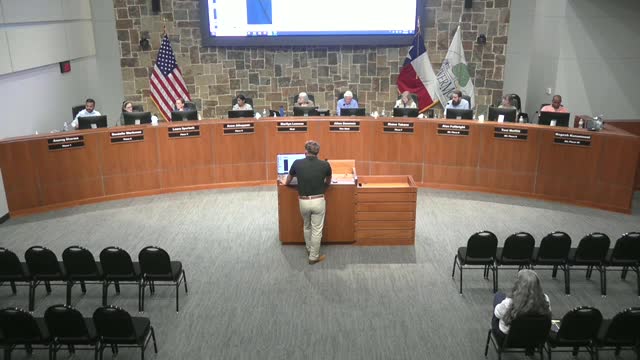Commission Discusses Strategies to Protect Post Oak Trees in Local Ecosystem
August 05, 2025 | Flower Mound, Denton County, Texas
This article was created by AI summarizing key points discussed. AI makes mistakes, so for full details and context, please refer to the video of the full meeting. Please report any errors so we can fix them. Report an error »

The Flower Mound Environmental Conservation Commission convened on August 5, 2025, to address critical issues surrounding local tree conservation, particularly focusing on the post oak species. The discussions highlighted the ongoing challenges the community faces in preserving this keystone tree, which plays a vital role in the local ecosystem.
A key point of discussion was the historical context of tree conservation efforts in Flower Mound. Commissioners reflected on past meetings, particularly from 2016, where discussions included various tree species and the associated fees for tree removal and mitigation. It was noted that while multiple species were considered, the current focus has shifted towards the post oak due to its unique environmental significance and the alarming rate at which it is being removed.
Commissioner Aftapan emphasized the importance of concentrating efforts on the post oak, suggesting that a targeted approach could yield better conservation outcomes. The post oak is recognized as a critical component of the local ecosystem, and its decline poses a significant threat to environmental stability in the region. The commission acknowledged that while other tree species can be easily replaced, the post oak's slow growth and unique characteristics make it irreplaceable once removed.
Concerns were raised about the financial implications of lowering mitigation fees for post oaks. Some commissioners expressed that reducing these fees could inadvertently lead to less replanting, as developers might opt to pay the fees rather than engage in the more labor-intensive process of planting and maintaining new trees. The balance between incentivizing conservation and ensuring adequate replanting efforts remains a crucial point of discussion.
The commission also discussed the need for better strategies to encourage the planting of post oaks, including potential partnerships with local nurseries and educational initiatives to inform developers about the importance of this species. The urgency of the situation was underscored by the observation that, despite decades of efforts, the community has not made significant progress in increasing the post oak population.
In conclusion, the meeting underscored the Flower Mound Environmental Conservation Commission's commitment to addressing the challenges facing post oaks. As the commission prepares for future discussions, the focus will remain on developing effective strategies to protect this vital species and enhance the overall health of the local ecosystem. The next steps will likely involve further research and community engagement to ensure that conservation efforts are both effective and sustainable.
A key point of discussion was the historical context of tree conservation efforts in Flower Mound. Commissioners reflected on past meetings, particularly from 2016, where discussions included various tree species and the associated fees for tree removal and mitigation. It was noted that while multiple species were considered, the current focus has shifted towards the post oak due to its unique environmental significance and the alarming rate at which it is being removed.
Commissioner Aftapan emphasized the importance of concentrating efforts on the post oak, suggesting that a targeted approach could yield better conservation outcomes. The post oak is recognized as a critical component of the local ecosystem, and its decline poses a significant threat to environmental stability in the region. The commission acknowledged that while other tree species can be easily replaced, the post oak's slow growth and unique characteristics make it irreplaceable once removed.
Concerns were raised about the financial implications of lowering mitigation fees for post oaks. Some commissioners expressed that reducing these fees could inadvertently lead to less replanting, as developers might opt to pay the fees rather than engage in the more labor-intensive process of planting and maintaining new trees. The balance between incentivizing conservation and ensuring adequate replanting efforts remains a crucial point of discussion.
The commission also discussed the need for better strategies to encourage the planting of post oaks, including potential partnerships with local nurseries and educational initiatives to inform developers about the importance of this species. The urgency of the situation was underscored by the observation that, despite decades of efforts, the community has not made significant progress in increasing the post oak population.
In conclusion, the meeting underscored the Flower Mound Environmental Conservation Commission's commitment to addressing the challenges facing post oaks. As the commission prepares for future discussions, the focus will remain on developing effective strategies to protect this vital species and enhance the overall health of the local ecosystem. The next steps will likely involve further research and community engagement to ensure that conservation efforts are both effective and sustainable.
View full meeting
This article is based on a recent meeting—watch the full video and explore the complete transcript for deeper insights into the discussion.
View full meeting
